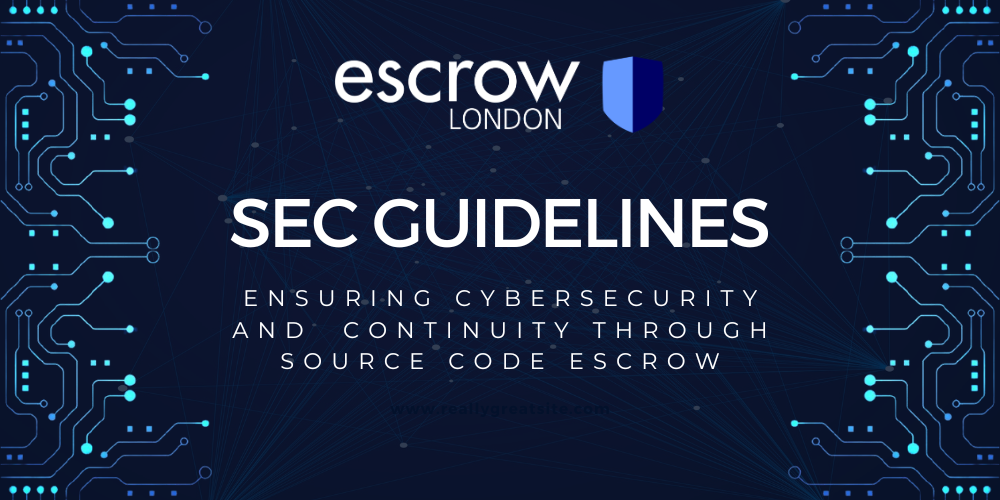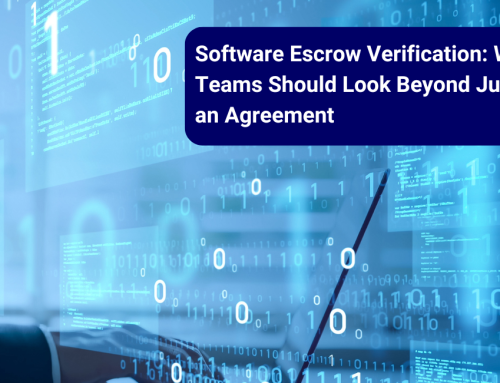Navigating SEC Guidelines: Ensuring Cybersecurity and Continuity through Source Code Escrow
In today’s digital landscape, cybersecurity has become a critical concern for businesses across multiple industries. The U.S. Securities and Exchange Commission (SEC) recognizes the significance of cybersecurity risk management, strategy, governance and incident disclosure for public companies.
In July this year, The SEC announced it has adopted rules requiring registrants to disclose material cybersecurity incidents they experience and to disclose on an annual basis material information regarding their cybersecurity risk management, strategy and governance. The SEC has also adopted new rules requiring foreign private issuers to make comparable disclosures.
As companies strive to meet these evolving guidelines, one strategy that has gained prominence is the utilization of source code escrow.
In this blog, we’ll delve into the SEC’s cybersecurity guidelines and explore how companies should approach source code escrow to ensure both compliance and business continuity.
Understanding SEC Cybersecurity Guidelines
The SEC’s guidance on cybersecurity emphasizes the importance of disclosing material cybersecurity risks and incidents in public filings to safeguard the integrity of financial markets and ensure proper disclosure. The potential for data loss presents a substantial material concern due to its capacity to compromise sensitive information, disrupt operations and erode stakeholder trust.
The Impact of Cybersecurity on Software Reliability
Today, software is the backbone of modern businesses, and its reliability is essential for maintaining operations. For public companies heavily reliant on software developed by third parties, the security and continuity of these software solutions are paramount. This is where source code escrow and SaaS escrow comes into play.
Source code escrow and SaaS Escrow involves depositing the source code and other critical materials of a software or cloud-based software application with a trusted third-party escrow agent. This arrangement ensures that if unforeseen circumstances, such as vendor bankruptcy or disruptions occur, the licensee can access and utilize the source code to maintain, modify or continue development of the software.
How does Source Code Escrow align with the SEC’s Cybersecurity Guidelines?
1. Disclosure of Material Risks: Publicly-traded companies are required by the SEC to provide accurate and complete disclosures in their financial reporting. If a company heavily relies on certain software services for its operations, disruptions in those services due to the SaaS provider’s financial instability could potentially impact the company’s ability to meet its obligations. In such cases, the company might need to disclose these risks and potential contingency plans to investors, which could involve referencing source code escrow or SaaS Escrow agreements as part of their risk mitigation strategy.
2. Vendor Management: The SEC encourages companies to conduct due diligence when dealing with third-party vendors. Utilizing source code escrow provides companies with an additional layer of assurance, as it ensures access to source code even if the vendor faces disruptions.
3. Business Continuity Planning: The ability to access escrowed source code can play a crucial role in a company’s business continuity planning. By maintaining the capability to modify or maintain software, a company can continue its operations.
4. Regulatory Compliance: The use of source code escrow aligns with the SEC’s emphasis on regulatory compliance. It showcases a commitment to ensuring the availability of critical software components and data, aligning with the broader goal of protecting shareholder interests.
As the SEC continues to focus on cybersecurity risk management, strategy, governance, and incident disclosure, public companies must explore innovative solutions to mitigate risks and ensure business continuity. Source code escrow and SaaS escrow presents an effective strategy that aligns with the SEC’s guidelines while addressing the intricate challenges posed by third-party software dependencies.
By implementing source code escrow or SaaS escrow arrangements, companies can maintain operational resilience and exhibit a proactive commitment to protecting their assets and stakeholders.
How Escrow London North America can help
Escrow London North America is recognized as a reliable and trusted partner globally in the source code escrow industry. We offer secure and robust source code escrow and SaaS continuity escrow services to safeguard valuable software and data that can be released in the event of third-party software supplier failure and then utilized to restore system functionality by the beneficiary or the software escrow vendor.
The team is here to not only help you adhere to the SEC’s guidelines but implement suitable software continuity services and plans to protect your organization from supply chain risks. Please do not hesitate to contact us.
##
About Escrow London North America
Escrow London North America is a global software and SaaS escrow company headquartered in Atlanta, GA with offices in London, UK, and Sydney, Australia.
We have invested considerable resources into innovation to reinvent source code escrow for a SaaS world. Escrow London provides a range of SaaS Continuity escrow solutions suitable for AWS, Microsoft Azure and Google Cloud hosted SaaS applications. We support a wide range of clients includes major law firms, banks, central banks, insurance companies, technology companies and government organizations.
To find out more about Software Escrow and SaaS Escrow, visit our YouTube channel.








